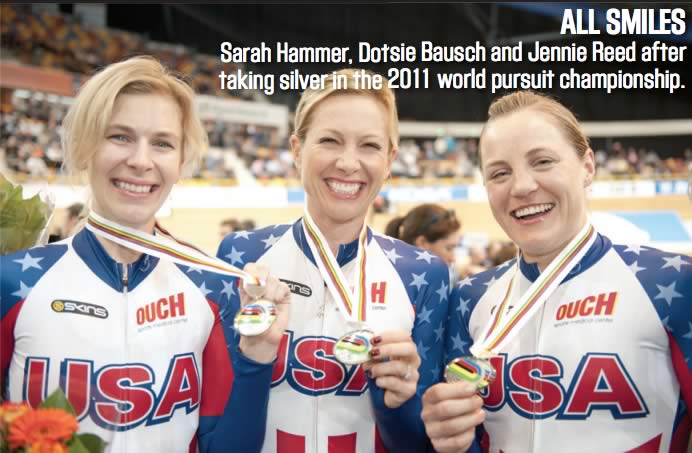How two of cycling’s top women deal with the psychological pressure of competition
You know the dream, the one where the floor swallows you whole, just in time for you to avoid the big event you’ve been targeting. Six-time U.S. national champion and women’s team pursuit world record holder Dotsie Bausch is all too familiar with a similar recurring vision. “The floor to the stalls in the bathroom collapse under me and I fall deep down into the bowels of the velodrome and I am never to be seen again. How weird is that?”
Cyclists face two equally important battles when they toe the line at a race: the physical demands of competition, and the psychological pressure to succeed. We are well aware of how to train the body for competition. We know about intervals and diet. We understand how power meters work and why they’re helpful. But when it comes to training the mind, many amateur cyclists simply don’t do it. They tend to brush that important part of the equation off, making a potentially fatal mistake.
For Bausch, the mental game is every bit as important as the physical. “While I physically train almost every single day, I mentally and emotionally train just as hard. You cannot expect your mind to be fi t and ready for the intensity of competition if you haven’t trained it to be that way. I use visualization techniques. I use vivid imagery work, incorporating all five senses and a lot of positive self-talk.”
Bausch has sought the advice of sports therapist Abigail Lufkin to help with the mental challenges of competition. “She helps me get mentally stronger. I think having a mental coach is just as important as having a physical one. If you can’t handle the stress and pressure of big competitions when it comes down to the wire, what were all those intervals and long rides for anyway?”
All riders at some point feel like they just can’t make it through a training session on a given day. To combat those feelings, Bausch remembers how fortunate she is to do what she does for a living. “I feel this entire process of being able to be a professional cyclist is a gift — considering my past and what I took my body through during my illness with an eating disorder 15 years ago. So, although I have days where I just don’t want to train, I always think back to those much darker days. Being able to do what I do is nothing shy of a miracle and that really motivates me.”
Bausch’s teammate Jennie Reed envisions the moment before a competition where she excuses herself to go to the bathroom and instead escapes the velodrome, simply walking out the front door to disappear. For top-level athletes like Bausch and Reed it is essential that they learn to convert that anxiety into positive energy on the track or the road. It is a process that takes practice and dedication.
For Reed, it’s the day before the race that really gets to her. “It’s the sitting around the hotel, resting up and waiting to get the show on the road. I have always struggled with sleeping the night before the race as well. I sometimes have thoughts that go through my head like, ‘I just can’t do this,’ and ‘Maybe someone else can go in for me.’ When that happens, I immediately turn those thoughts into statements like, ‘This is what you love to do, go after it.’ When I start to turn those thoughts around, I get excited rather than scared or nervous. I get excited about the thrill of competition and the challenge of putting myself out there in that very moment to see what limits I am capable of, both physically and mentally. I love that. You really see your character in competition.”
For Bausch, dealing effectively with mental distractions and negative thoughts is the key to success. “Each time I have a negative thought, I have to work and employ my mental training strategies to counteract them. If I had not prepared for these situations with mental toughness training, I would be a complete basket case by the time competition started. It’s all about staying relaxed and conserving energy throughout the day so that you have it when you need it.”
At a basic level, performance anxiety is fear — fear of not fulfilling your potential, of making a mistake, of looking bad, of losing. However, anxiety and fear use energy, and energy is essential for winning races. Below are sports psychology consultant Abigail Lufkin’s tips on making this energy work for you.
Spend six minutes a day using all of your senses to imagine your perfect race
If critical thoughts arise, replace them with positive thoughts
Act “as if” you feel confident, invigorated, relaxed and ready for the challenge
Cultivate the feeling of fun
During a race, think specifically about what you need to do, not about winning
Focus only on the things you can control
Interpret race day jitters as signals that you are energized and ready for the challenge

